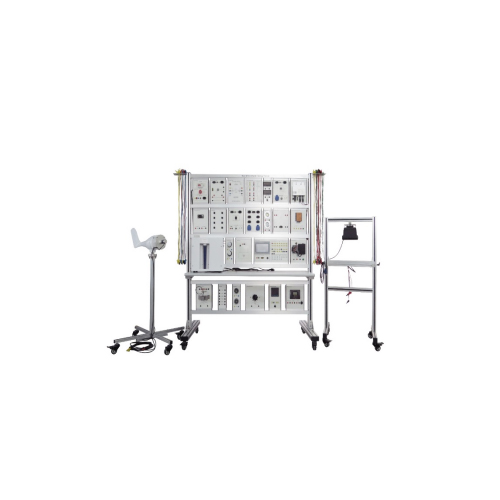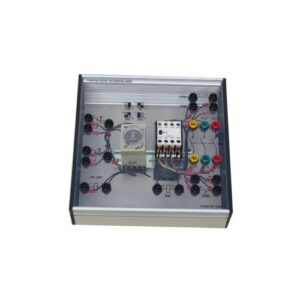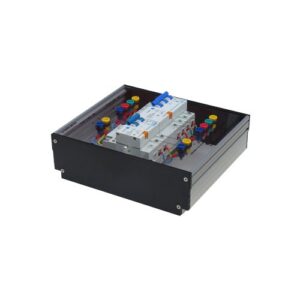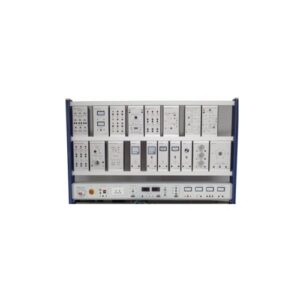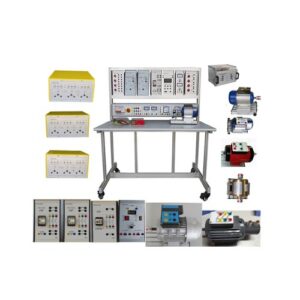ATB20230308R-010 Clean Energy Trainer
Features :
– Experimenting in solar, wind and hydrogen based electricity production
– Solar Energy Experiments unit
– Wind Power Experiments unit
– Hydrogen Energy Experiments unit
– The entire set of experiment unit consists of modules that can be easily attached and
removed to main unit depending on the experimental work to be carried out
Main Unit :
– Mobile stand : min. made of 45×90 sigma aluminum profile
– Table in which suitable for laboratory conditions : min. 140x80x3 cm
– Cable holder : min. 5 corrugated cable holder with min. 40 cable capacity
– Module area : min. 3 aluminum areas where the modules can be located in the main unit
– Mobile casters
Module :
- Wind Turbine Module
1.1. Power: min. 200W
1.2. Aluminum body
1.3. DC motor driven : min. 150W
1.4. Connection terminals: min. 4mm safety sockets
- Wind Simulator Module
2.1. Module has IEC connector, lamp and fuse
2.2. Selection switch for manual and PC operation
2.3. Manually adjusting the DC engine rpm
2.4. Ability to adjust DC motor rpm with computer
2.5. Control power : min. 200W
2.6. Connection terminals: min. 4mm safety sockets
- Wind Turbine Charge Control Module
3.1. Rated voltage of the battery: min. 12 / 24V
3.2. Wind turbine braking voltage: min. 15 / 30V
3.3. Aluminum body with coolant specification
3.4. Connection terminals: min. 4mm safety sockets
- Light Angle Adjustable Solar Panel
4.1. Mobile stand : min. made of 45×45 sigma aluminum
4.2. polycrystalline panel : min. 2 pieces 10W
4.3. min. 3 different settings for solar position simulation
4.5. Scale indicating the setting value
4.6. Projector : min. 500W
4.7. Connection terminals: min. 4mm safety sockets
- Accumulator Module
5.1. Maintenance-free type
5.2. Voltage: 12V
5.3. Capacity: min. 7Ah
5.4. Overcurrent protection
5.5. Connection terminals:min. 4mm safety soc+AD21kets
- 220V AC Lamp Module
6.1. AE27 or AE14 lampholder
6.2. Energy saving lamp
6.3. LED Lamp
6.4. Connection terminals: min. 4mm safety sockets
- 12V DC Lamp Module
7.1. Halogen Lamp : min. 20W
7.2. LED lamp : min. 2W
7.3. Operation voltage: 12V
7.4. Connection terminals: min. 4mm safety sockets
- Energy Distribution Module
8.1. IEC sockets : min. 4 pcs
8.2. Grounded sockets : min. 2 pcs
8.3. Connection terminals: min. 4mm safety sockets
- Light Source Control Module
9.1. PC and manual adjustment options
9.2. Analog input connector for manual control
9.3. output power : min 1000W
9.4. Connection terminals: min. 4mm safety sockets
- PC Interface Module
10.1. Module has IEC connector, lamp and fuse
10.2. min. 2 pcs independent analog signal outputs (0-5V)
10.3. min. 1 pcs USB terminal
10.4. min. 2 pcs RS 485 ports
10.5. min. 1 pcs RS 232 port
10.6. Connection terminals: min 4mm safety sockets
- AC/DC Measurement Module
11.1. Ammeter : min 0-5A for AC and DC
11.2. Voltmeter : min. 0-500 V for AC and DC
11.3. Operation voltage : 230V, 50Hz
11.4. Communicating with the training set software via RS 485 port
11.5. Connection terminals: min 4mm safety sockets
- Diode Module
12.1. min. 6 pcs high-current diodes
12.2. Connection terminals: min. 4mm safety sockets
- Off – Grid Inverter Module
13.1. Input voltage : 12V DC and output voltage : 230V AC
13.2. Output voltage is full sine, output power : up to 300W
13.3. Thermal and overload protection
13.4. Protection of short circuit and reverse connection
13.5. Connection terminals: min. 4mm safety sockets
- Solar Charge Regulator Module
14.1. 12/24V automatic input voltage switched
14.2. Charging / Discharge current : min. 10 A
14.3. Solar, Battery and DC load connection terminals
14.4. Connection terminals: min. 4mm safety sockets
- Electronic Meter Module
15.1. 3 phase measurement specifications
15.2. Rated voltage: 220/400V
15.3. Frequency: 50 Hz
15.4. Operation current: min. 0.2 – 5 A
15.5. Connection terminals: min. 4mm safety sockets
- Electronic Potentiometer Module
16.1. Touch screen
16.2. Power: 100 W
16.3. Ability to set operation voltage and current via touch screen
16.4. Adjustable via PC
16.5. Connection terminals: 4mm safety sockets
- Solar Panel Emulator Module
17.1. Operation voltage : min. between 88-264 VAC, 47 … 63 Hz
17.2. Output voltage: min. 20V
17.3. Short circuit current: min. 2 A
17.4. Bypass diode connection
17.5. The connection of blocking diode
17.6. Connection terminals: min. 4mm safety sockets
- Analog Measurement Module
18.1. Analog ammeter : min. 0-5A
18.2. Analog voltmeter : min. 0-20V
18.3. Connection terminals: min. 4mm safety sockets
- Linear Potentiometer Module
19.1. min. 0-1K Ohm
19.2. min. 0-50 Ohm maximum 6A
19.3. min. 51-200 Ohm maximum 2A
19.4. min. 201-1K Ohm max 0.6A
19.5. Connection terminals: min. 4mm safety sockets
- AC Energy Analyzer Module
20.1. Operation voltage: 100-240V AC, 110-250V DC
20.2. Current inputs: up to 5A
20.3. Measurement accuracy: min. ± 1%
20.4. Module has IEC connector, lamp and fuse
20.5. PC connection
20.6. Connection terminals: min. 4mm safety sockets
- DC Power Supply Module
21.1. min. 0-30V adjustable short circuit and over current
protection,programmable power supply
21.2. DC source current : min. can be set in the range 0-5A.
21.3. Power supply with color LCD monitor shows current, voltage and instantaneous
power values.
21.4. The front panel of the energy unit is made of min. 4 mm compact laminate.
21.5. Text and figures on the panel are formed by mechanical scraping.
21.6. The body of the energy unit : made min. of 0.8 mm sheet metal and painted
with electrostatic paint.
21.7. Connection terminals: min. 4mm safety sockets
- Hydrogen Energy Module
22.1. Fuel cell rated power: min. 30W
22.2. Number of Cells: min. 14
22.3. Rated performance: min. 8.4V, 3.6A
22.4. Purge valve voltage: min. 6V
22.5. Fan voltage: min. 5V
22.6. Hydrogen pressure: min. between 0.45 – 0.55 bar
22.7. Fan with coolant
22.8. Output gas flow amount: max. 0.42L / min
22.9. Hydrogen purity (%): up to 99,995 (dry hydrogen)
22.10. System efficiency: at least 39% at Full power
22.11. Connection terminals: min. 4mm safety sockets
Solar Energy Experiments List :
- Photovoltaic Panel Experiments
- Measurement of Photovoltaic Panel Open Circuit Voltage
- Measurement of Photovoltaic Panel Short Circuit Current
- Photovoltaic Panel Current Voltage Characterization
- Examination of Photovoltaic Panels No-load Output Voltage Relative to the
Whole-Day Movement
- Examination of Photovoltaic Panels Loaded Output Voltage Relative to the
Whole-Day Movement
- Examination of Photovoltaic Panels Seasonal No-load Output Voltage
- Examination of Photovoltaic Panels Seasonal Loaded Output Voltage
- Series Connection of Photovoltaic Panels
- Examination of Parallel Connection of Photovoltaic Panels
- Examination of Photovoltaic Panel Simulator
- Examination of Shadow Effect on Photovoltaic Panels
- Examination of Bypass Diode Effect on Photovoltaic Panels
- Examination of Mismatching Effect on Photovoltaic Panels
- Examination of the Effect of Blocking Diodes on Photovoltaic Panels
- Photovoltaic Panel Emulator Examination
- Photovoltaic System Experiments
- Directly Connecting Photovoltaic Panel to Load
- OFF GRID Inverter Startup (No-Load)
- Installation of the Basic Photovoltaic System (DC Load)
- Installation of Basic Photovoltaic System (AC Load)
- Examination of OFF GRID Inverter Output Signal with DAQ Module
- OFF GRID Inverter Output Signal Measurement by Energy Analyzer
- Measurement of Energy Taken from OFF GRID Inverter
- Measurement of OFF GRID Inverter Output Power and its Efficiency
- OFF GRID Inverter SCADA Application
- Examination of ON GRID Inverter
Wind Power Experiments List :
- Examination of the Relationship between Turbine Speed and Wind Turbine Output
Voltage (No-load Operation)
- Examination of the Relationship between Turbine Speed and Wind Turbine Output
Voltage (Loaded Operation)
- Examining Wind Turbine Controller Effect on the Relation Between Turbine Speed
and Turbine Output Voltage (No Load Operation)
- Examining Wind Turbine Controller Effect on the Relation Between Turbine Speed
and Turbine Output Voltage (Loaded Operation)
- Examination of Wind Turbine Output Voltage
- Examination of Wind Energy System
Hydrogen Energy Experiments List :
- Examination of Hydrogen Fuel Cell Output Voltage
Supplied including:
– Standard accessories

